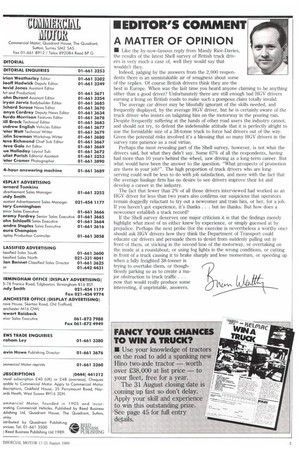A MATTER OF OPINION
Page 5

If you've noticed an error in this article please click here to report it so we can fix it.
Like the by-now-tamous reply from Mandy Rice-Davies. the results of the latest Shell survey of British truck drivers is very much a case of, well they would say that wouldn't they.
Indeed, judging by the answers from the 2,000 respondents there is an unmistakable air of smugness about some of the replies. Of course British drivers think they are the best in Europe. When was the lait time you heard anyone claiming to be anything other than a good driver? Unfortunately there are still enough bad HGV drivers earning a living on British roads to make such a pompous claim totally invalid.
The average car driver may be blissfully ignorant of the skills needed, and frequently displayed, by the average HGV driver, but he is certainly aware of the truck driver who insists on tailgating him on the motorway in the pouring rain. Despite frequently suffering at the hands of other road users the industry cannot, and should not try, to defend the indefensible attitude that it is perfectly alright to use the formidable size of a 38-tonne truck to force bad drivers out of the way. Given the potential risks involved it's a blessing that so many HGV drivers in the survey rate patience as a real virtue.
Perhaps the most revealing part of the Shell survey, however, is not what the drivers said, but what they didn't say. Some 67% of all the respondents, having had more than 10 years behind the wheel, saw driving as a long-term career. But what would have been the answer to the question. "What prospects of promotion are there in your job?". The high proportion of truck drivers who are longserving could well be less to do with job satisfaction, and more with the fact that the average haulage firm has no desire to see drivers improve their lot and develop a career in the industry.
The fact that fewer than 2% of all those drivers interviewed had worked as an HGV driver for less than two years also confirms our suspicions that operators remain doggedly reluctant to try out a newcomer and train him, or her, for a job. If you haven't got experience, it's thanks. . . but no thanks. But how does a newcomer establish a track record?
If the Shell survey deserves one major criticism it is that the findings merely highlight what most of us either knew by experience, or simply guessed at by prejudice. Perhaps the next probe (for the exercise is nevertheless a worthy one) should ask HGV drivers how they think the Department of Transport could educate car drivers and persuade them to desist from suddenly pulling out in front of them, or sticking in the second lane of the motorway, or overtaking on the inside at a roundabout, or using fog lights in the wrong conditions, or cutting in front of a truck causing it to brake sharply and lose momentum, or speeding up when a fully freighted 38-tonner is trying to overtake them, or thoughtlessly parking so as to create a major obstruction to truck traffic. . . now that would really produce some interesting, if unprintable, answers.




































































































